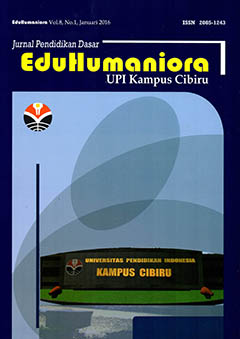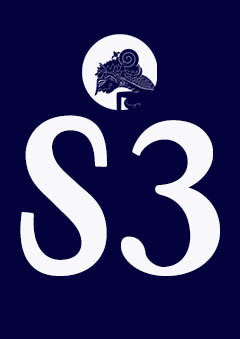The Digital World in the Grasp of Elementary School Children: A Systematic Literature Review of Digital Literacy
Abstract
This study aims to examine the implementation of digital literacy in elementary schools through the Systematic Literature Review (SLR) approach. This research is motivated by the urgency of mastering digital literacy at the elementary school level to face the challenges of the 21st century. A total of 200 articles were identified and selected using the Google Scholar database with the help of the Publish or Perish (PoP) application, and 14 articles were obtained that met the inclusion criteria. The results showed that the most dominant approach was qualitative and developmental research (RnD), with the main subjects of primary school students (71.4%). The most studied component of digital literacy is access to technology (85.7%), while the dimensions of digital ethics and security still receive less attention (28.6% each). This shows the need for a more comprehensive approach so that students are not only able to access digital information, but also be able to use it responsibly and safely. This research contributes by mapping trends, challenges, and opportunities in the implementation of digital literacy in primary education, as well as offering practical recommendations in the form of developing digital literacy training for teachers and developing more contextual and sustainable digital learning strategies.
Keywords
Full Text:
PDFReferences
Amelia, R., Suriansya, A., Cinantya, C., & Revia, W. (2025). Empowering future educators : Analyzing digital literacy skills in elementary teaching assistants ( TAS ). 6(2), 70–84.
Aqil Siroj, H., Witono, A. H., & Khair, B. N. (2022). Pengaruh literasi digital terhadap minat baca siswa kelas V di SDN 1 Dasan Tapen tahun pelajaran 2021/2022. Jurnal Ilmiah Profesi Pendidikan, 7(3), 1049–1057. https://doi.org/10.29303/jipp.v7i3.668.
Arifin, S., Rufiana, I. S., Anggraini, A. E., Dasar, P., Pascasarjana, S., & Malang, U. N. (2024). Pelatihan pengembangan desain pembelajaran matematika berbasis talent LMS berbantuan media PhET interactive simulation bagi guru sekolah dasar. Journal of Innovation and Sustainable Empowerment, 3(2), 94-99.
Arifuddin, A., Khoiriyah, S., Sugianto, H., & Karim, A. R. (2025). Integrating technological pedagogical content knowledge in learning: A systematic review. Journal of Research in Instructional, 5(1), 16–39. https://doi.org/10.30862/jri.v5i1.429.
Cahyani, N. L. P., & Jayanta, I. N. L. (2021). Digital literacy-based learning video on the topic of natural resources and technology for grade IV elementary school. Jurnal Ilmiah Sekolah Dasar, 5(3), 538. https://doi.org/10.23887/jisd.v5i3.37918.
Carrera-Rivera, A., Ochoa, W., Larrinaga, F., & Lasa, G. (2022). How-to conduct a systematic literature review: A quick guide for computer science research. MethodsX, 9, 101895. https://doi.org/10.1016/j.mex.2022.101895.
Haddaway, N. R., Page, M. J., Pritchard, C. C., & McGuinness, L. A. (2022). PRISMA2020: An R package and Shiny app for producing PRISMA 2020-compliant flow diagrams, with interactivity for optimised digital transparency and Open Synthesis. Campbell Systematic Reviews, 18(2), 1–12. https://doi.org/10.1002/cl2.1230.
Haleem, A., Javaid, M., Qadri, M. A., & Suman, R. (2022). Understanding the role of digital technologies in education: A review. Sustainable Operations and Computers, 3(February), 275–285. https://doi.org/10.1016/j.susoc.2022.05.004.
Hidayat, D., Sectio, I., Satyani, C., Amalia, P. A., & Dewasandra, S. A. (2024). Digital literacy of elementary school students based on sundanese culture. 8(2).
Hidayati, N., Farida Nugrahani, & Suwarto. (2024). Pengaruh kemampuan berpikir kritis dan minat baca terhadap kemampuan literasi digital. Didaktika: Jurnal Kependidikan, 13(3 SE-Articles), 3201–3212. https://mail.jurnaldidaktika.org/contents/article/view/760.
Kamaliah, Lutfiyatul, rosidah cholifatur. (2025). Peran pendidikan dalam pengembangan literasi digital. 12(2), 746–757.
Karampelas, K. (2023). Examining the relationship between TPACK and STEAM through a bibliometric study. European Journal of Science and Mathematics Education, 11(3), 488–498. https://doi.org/10.30935/scimath/12981.
Kusumaningrum, S. R., Widiati, U., Anwar, K., & Farisia, H. (2022). Integrating the technology in teaching and learning process through digital media creation as a way to improve Indonesian EYL teachers’ competence. Jurnal Pendidikan: Teori, Penelitian, Dan Pengembangan, 7(5), 197. https://doi.org/10.17977/jptpp.v7i5.15268.
Kusumo, F. A., Subali, B., & Sunarto, S. (2022). The analysis of student’s digital literacy with microsoft e-learning media. Journal of Primary Education, 11(2), 165–177. https://journal.unnes.ac.id/sju/index.php/jpe.
Lukman. (2023). Rendahnya pemanfaatan media pembelajaran digital pada pembelajaran anak usia dini. Al-Athfal, 4(2), 87–96. https://doi.org/10.58410/al-athfal.v4i2.810.
Marmoah, S., Poerwanti, J. I. S., Suharno, & Gestiardi, R. (2023). The quality management of education in elementary schools in improving teachers’ digital literacy in the era of online learning. 14(1), 32–40. https://doi.org/10.47750/pegegog.14.01.04.
Muna, A. K., Nuswowati, M., & Naryatmojo, D. L. (2023). Development of literacy game media for grade IV elementary school students. Jurnal Cakrawala Pendas, 9(3), 409–419.
Nurfauziyanti, F., Damanhuri, & Bahrudin, F. A. (2022). Pengaruh literasi digital terhadap perkembangan wawasan kebangsaan mahasiswa. Jurnal Pendidikan Kewarganegaraan Undiksha, 10(3), 54–66. https://doi.org/10.23887/jpku.v10i3.51067.
Patras, Y. E., Juliani, A., Nurhasanah, N., Maksum, A., & Hidayat, R. (2023). A review of culture-based learning at primary level in Indonesia. AL-ISHLAH: Jurnal Pendidikan, 15(3), 3923–3936. https://doi.org/10.35445/alishlah.v15i3.3525.
Pratama, F. R., Komariah, N., & Rodiah, S. (2023). Hubungan antara kemampuan literasi digital dengan pencegahan berita hoaks di kalangan mahasiswa. Informatio: Journal of Library and Information Science, 2(3), 165. https://doi.org/10.24198/inf.v2i3.43792.
Rabbani, D. A., & Najicha, F. U. (2023). Pengaruh perkembangan teknologi terhadap kehidupan dan interaksi sosial masyarakat Indonesia. Researchgate. Net, November, 0– 13. https://www.researchgate.net/profile/Dana-Rabbani/publication/375525102_Pengaruh_Perkembangan_Teknologi_terhadap_Kehidupan_dan_Interaksi_Sosial_Masyarakat_Indonesia/links/654dcc8dce88b87031d8db65/Pengaruh-Perkembangan-Teknologi-terhadap-Kehidupan-dan-Inte.
Ramadhani, R. P., Setyowati, R. N., & Kristanto, A. (2024). Use of interactive multimedia to improve digital literacy in elementary schools. International Journal of Emerging Research and Review, 2(2), 000058. https://doi.org/10.56707/ijoerar.v2i2.58.
Resti, R., Wati, R. A., Ma’Arif, S., & Syarifuddin, S. (2024). Pemanfaatan media pembelajaran berbasis teknologi sebagai alat untuk meningkatkan kemampuan literasi digital siswa sekolah dasar. Al Madrasah Jurnal Pendidikan Madrasah Ibtidaiya, 8(3), 1145. https://doi.org/10.35931/am.v8i3.3563.
Rindrayani, S. R., Widyawati, L., & Dirgantoro, A. (2025). The effect of digital literacy, gadget use, and availability of technological media in school on junior high school students’ learning motivation. 3(1), 1–11.
Rizqiyani, R., Karnita, N., Laela, W., Wati, K., & Rasilah, R. (2024). Pembelajaran bangun ruang menggunakan media video animasi. Didactical Mathematics, 6(2), 222–229.
Saleh, Y., Mahat, H., Hashim, M., Nayan, N., Suhaili, S., Ghazali, M. K. A., Hayati, R., & Utami, R. K. S. (2021). A systematic literature review (SLR) on the development of sustainable heritage cities in Malaysia. Journal of Regional and City Planning, 32(3), 290–310. https://doi.org/10.5614/jpwk.2021.32.3.6.
Santoso, A. D., Nasyaya, A., Nengyanti, & Junaidi. (2021). Integrasi penggunaan media sosial dalam pelayanan publik untuk merespon pandemi COVID-19. CARADDE: Jurnal Pengabdian Kepada Masyarakat, 4(1), 2–9. https://journal.ilininstitute.com/index.php/caradde/article/view/817.
Sarbani, Y. A., Mulyati, H., & Astuti, S. I. (2024). Literasi digital, lansia, dan konstruktivisme. scriptura, 14(1), 72–81. https://doi.org/10.9744/scriptura.14.1.72-81.
Silalahi, D. E., Silalahi, D. E., Munthe, E. A. H. B., Wahyuni, M. M. S. S., Jamaludin, R. M., Laela, N. A., & Safii, D. M. M. S. A. R. H. M. (2022). Literasi digital berbasis pendidikan. In Pt. Global Eksekutif Teknologi.
Skulmowski, A., & Xu, K. M. (2022). Understanding cognitive load in digital and online learning: A new perspective on extraneous cognitive load. Educational Psychology Review, 34(1), 171–196. https://doi.org/10.1007/s10648-021-09624-7.
Soufghalem, A. (2024). The role of technology in enhancing digital literacy skills among secondary school students. International Journal of Post Axial: Futuristic Teaching and Learning, 2(4), 203–214. https://doi.org/10.59944/postaxial.v2i4.390.
Suhari, Y., Khristianto, T., & Jananto, A. (2024). Pemberdayaan literasi digital : Memperkaya konten situs web untuk pendidikan bagi pengelola situs web sekolah dasar di Kota Semarang. Jurnal Pengabdian Sosial, 1(6), 383–389. https://doi.org/10.59837/swc19p76.
Sukma, R., Dewi, I., Animatul, L., Ekawati, R., Randy, M. Y., Fatiha, A., Anggraini, F., Pramesti, A., Arina, N., Malang, U. N., Professional, T., Study, E., & Malang, U. N. (2025). Development of learning media based on articulate storyline 3 to improve numeracy literacy skills at SDN Kasembon 1 and 3 Kasembon District Malang Regency. 10(2), 230–247.
Tedja, B., Al Musadieq, M., Kusumawati, A., & Yulianto, E. (2024). Systematic literature review using PRISMA: Exploring the influence of service quality and perceived value on satisfaction and intention to continue relationship. Future Business Journal, 10(1), 1–9. https://doi.org/10.1186/s43093-024-00326-4.
Triandayani, A., Fadlozi, Y. M., Barzegar, S., & Quijano JR, G. N. (2024). Increasing students’ digital literacy through the use of google cardboard media on the theme of my dreams in class IV of elementary school. Indonesian Journal of Education Research (IJoER), 5(1), 35–42. https://doi.org/10.37251/ijoer.v5i1.872.
Turnip, R. S. (2023). Peningkatan literasi digital di kalangan pelajar: pengenalan dan praktik penggunaan teknologi pendidikan. Jurnal Review Pendidikan Dan Pengajaran, 6(4), 2302–2310.
Ulya, Z. (2024). Penerapan teori konstruktivisme menurut Jean Piaget dan teori Neuroscience dalam pendidikan. Al-Mudarris: Journal of Education, 7(1), 12–23. https://doi.org/10.32478/vg1nnv56.
Uswah, A. Y., Mukni’ah, M., & Hartono, H. (2024). Analyzing the impact of android usage on social interaction of elementary school students. EduHumaniora|Jurnal Pendidikan Dasar Kampus Cibiru, 16(1), 77–88. https://doi.org/10.17509/eh.v16i1.57077.
William, A. B., Hayes, D., & Freire, R. (2025). Digital Literacy in the classroom : Exploring the effects of technology integration on literacy skills in Philippine elementary schools. January.
Zulqadri, D. M., & Nurgiyantoro, B. (2023). Pengembangan multimedia interaktif berbasis web untuk meningkatkan literasi budaya dan literasi digital siswa kelas V SD/MI. JURNAL IPTEKKOM Jurnal Ilmu Pengetahuan & Teknologi Informasi, 25(1), 103–120. https://doi.org/10.17933/iptekkom.25.1.2023.103-120.
DOI: https://doi.org/10.17509/eh.v17i2.82543
Refbacks
- There are currently no refbacks.
Copyright (c) 2025 EduHumaniora | Jurnal Pendidikan Dasar Kampus Cibiru
EduHumaniora: Jurnal Pendidikan Dasar
Published in collaboration Program Studi PGSD UPI Kampus Cibiru
and
HDPGSDI
This work is licensed under a Creative Commons Attribution-ShareAlike 4.0 International License.















